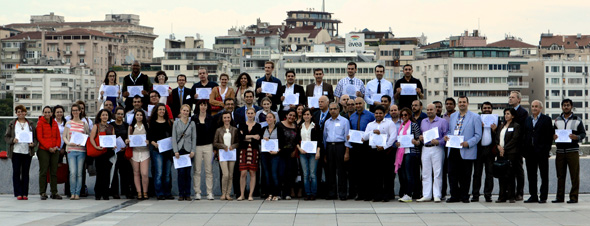Brain-drain in Turkish Catacombs
Report of the 6th Examination of the European Board of Neurology
Jan Kuks, Gabrielle Lohner
UEMS Section of Neurology - European Board Neurology
Proving is improving. This was the drive for many candidates taking the 6th European Board examination in Neurology in Istanbul on May 30th. The examination has been a joint development of the UEMS/EBN with the ENS and EFNS.
65 candidates (Austria, Belgium, Cyprus, Greece, Portugal, Slovenia, Spain, Turkey, UK, USA, Australia, Egypt, India, Iran, Iraq, Qatar, Saudi Arabia, Tunisia, UAE, Yemen) applied and finally 61 of them left the sunny world to go down to the 3rd underground floor of the Istanbul Congress center. Most of the candidates had been motivated to do so by colleagues, who had taken the Board Exam before; many others had been stimulated by their supervisors and tutors for approval on a European level.
The first battle was fought with 100 multiple choice questions (MCQ) – one correct answer out of five statements. Most candidates were satisfied with the 150 minutes they were given to complete the paper. After a short coffee-break the next two and a half hour were allocated for 60 extended matching questions (EMQ). In this question-type, the student gets four clinical scenarios and 8-20 items with the task of selecting one of these to best match each scenario. Mostly a diagnosis had to be assigned to a scenario but a therapy or a clinical investigation appropriate to the patient scenario would be other possibilities. Generally the EMQs were considered more difficult than MCQs and about 20% of the candidates felt that three hours was needed to answer all the questions. Invigilators were available for advice on translation issues or clarification of questions.
Ten examiners were present to set the passing limits for the written exams under supervision of two medical education experts and to take part in the 10 minute oral examination which comprised the third part of the exam. In the oral examination the candidates have to present a case of their choice.
By the end of the day statistical analysis was available and this led to exclusion of 4 questions from the whole set of 160 MCQs and EMQs. Further calculation, approved by the examiners, revealed that 57 candidates had successfully passed the exam and became either fellows of the UEMS/EBN or they received a diploma of the UEMS/EBN. This distinction is necessary, as all European candidates have a locally certified clinical training in an EU/EEA country and Turkey, whereas the other candidates do not have this training. We congratulate them on their achievement. The four unlucky participants will receive written feedback with suggestions on how to improve their question answering and knowledge skills, and the opportunity to take their revenge for free at the next board exam on June 19th at the EAN-congress in Berlin.
The photograph has not been taken from the cover of a Handbook on Relief, but shows the candidates who had passed the exam.
We are most happy to note that the number of participants, taking the European Board Exam in Neurology, is increasing year by year, and we sincerely hope to develop an exam that will be taken by all neurology trainees , particularly those who wish to extend their experience beyond the borders of their own country. In the next few years, the exam will undergo several modifications concerning content and structure, and an attempt will be made to lower the admission fees to make it more attractive for trainees from all parts of Europe.
Have a look at the website and we would welcome any comments which should be sent to This email address is being protected from spambots. You need JavaScript enabled to view it.
And last but not least take the challenge to test yourself at the next examination on June 19th 2015.
Berlin Needs You.

6th European Board Examination in Neurology – May 30, 2014 – Istanbul/Turkey
